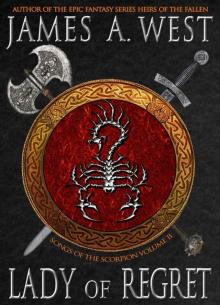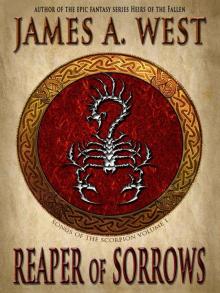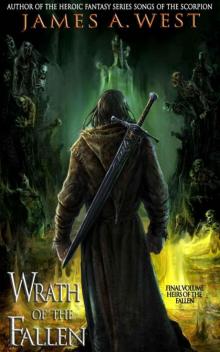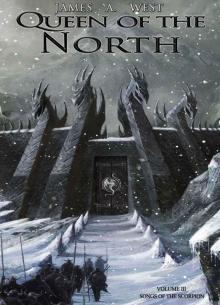- Home
- James A. West
Heirs of the Fallen: Book 03 - Shadow and Steel Page 11
Heirs of the Fallen: Book 03 - Shadow and Steel Read online
Page 11
Adham abandoned the two to their wine, and went to find Adu’lin. If not for desperation, he would not have lowered himself to speak with that yellow snake of a man. Adham did not trust the Fauthian or his people. In truth, he did not believe they were people at all, but something very much akin to Alon’mahk’lar. Who knew what the Fallen were capable of creating?
He found Adu’lin speaking quietly to a group of his folk, who sat on benches fashioned after nude children—human children, Adham noted uncomfortably. Behind them stood a fountain fashioned into a wrinkled crone of hammered bronze, with a crown of ruby horns, and pendulous breasts that streamed water from jade nipples; below the waist, she became a stone serpent of thick coils that trailed into a pool tiled in eye-wrenching patterns.
Tearing his gaze from the fountain, Adham demanded, “Have you seen my son?”
“Which one of you would that be?” Adu’lin asked, smirking. “Forgive me, but you all look so much alike to us.”
Adham tried to ignore the Fauthians’ sniggering, but the cracking knuckles of his tightening hand gave evidence of his irritation. “He is the youngest of our party,” Adham grated. “His name is Leitos. He was not abed this morning, and may not have been all night.”
Adu’lin favored him with an unreadable expression, though a flicker of some emotion—surprise, alarm, wrath?—lit his stare. “As I warned you and the others, this city is ancient and far larger than my people can fully inhabit. As such, much of Armala is dangerous for its sad state of neglect. If your son has gone nosing about where he ought not—which Ba’Sel assured me none of his men would do—then it is possible some ill has befallen him.”
In a voice low and dangerous, Adham said, “Listen well, you goat-buggering serpent, if you know where my son is, tell me. If not, then get off your scrawny backside, and start searching this befouled city for him.” He reached for his sword to emphasize his point, belatedly remembering that it was not there. He had his dagger tucked under this robes, but thought better about drawing it.
Each Fauthian watched his hand clutch the empty air at his hip, and their amber eyes narrowed to slits. A smug look passed over Adu’lin’s thin face. “We are all friends here. Surely there is no need for hostility?”
“Forgive me,” Adham forced himself to say, suddenly feeling imperiled. “Concern for my son has soured my manners. I would like to search for my son, but I do not know the city, or where to start. I … I need your help.”
“Of course,” Adu’lin said, placid and accommodating once more. “But as you would only hinder us, I must ask you to return to your quarters. Trust that we will find your son … if he is in the city.”
“Where else would he be?”
Adu’lin shrugged. “We place guards on the walls to keep the Yatoans out, not to keep our people in. But then, we know better than to venture outside the city. It is conceivable that your son might have disregarded my warnings, and left Armala. I hope that is not so … as should you.”
After leaving Adu’lin, Adham returned to his quarters and paced, wall to wall. Every hour on the hour, he went to Leitos’s room, hoping he had returned. The chamber remained empty.
Now, with the sun westering toward its nightly slumber, and still no word from Adu’lin’s search party, his worry became stark fear. Adham cursed himself for not insisting on joining the Fauthians, and he cursed Ba’Sel and the others for their careless indifference about … well, everything. No one asked after the Fauthians’ disregard for repairing a Kelren ship, no one spoke of training, no one seemed interested in returning to Geldain to fight the Faceless One and his minions.
Something was foul in Armala, and Adham needed answers—he intended to get them, with or without the help of the Brothers of the Crimson Shield.
Chapter 19
“You cannot put him to death,” Belina warned, looking at her father over the fire’s glowing embers. An opening in the hut’s roof created a gentle draft, drawing out the smoke, even as it ushered in fresh air under the edges of the domed shelter.
“My decision is final,” Damoc said. “We do not know if this Leitos is in league with the Fauthians and the Faceless One, but we cannot take the chance that he is. If we are betrayed now, our homelands are lost to us forever.”
Our homelands were lost when our forefathers traded the defilement of our mothers and daughters for the illusion of peace, Belina thought but did not say. There was no point voicing aloud what her father knew in his heart, even if he refused to admit it with his mouth.
For generations after the Upheaval, Yatoan womenfolk had given themselves to the godlike Fauthians, who in turn gave them over to Mahk’lar for the creation of Alon’mahk’lar. Bearing those monsters changed the women. They became as living ghosts, and their love grew cold. After bringing forth demonic life, the only thing that gave them pleasure or purpose was to offer themselves for breeding, again and again.
In time, the Alon’mahk’lar race grew plentiful, and the Fauthians conceived of a new race with which to gift the Faceless One—the Na’mihn’teghul, changelings, created by breeding women to Alon’mahk’lar. Only the hardiest woman survived those cruel assaults. Fewer still survived the long pregnancies required for Na’mihn’teghul young, let alone the birth.
Belina’s father and mother, like all Yatoans, had dutifully bowed to their masters’ plan, and to them was born a daughter, Belina’s older sister. When the Fauthians had come to claim the child for their own purposes, it had broken what little remained of their mother’s mind. One night, just as Belina had seen in a dream-vision, her mother had risen and given herself to the sea.
With the death of his wife, and the abduction of his eldest daughter, Damoc awakened and found his purpose. He opened the eyes of his people to the truth of their servitude, to the horrors forced upon them. In doing so, he began a war of resistance against the Fauthians, and their demon-born host. In time, her father proposed retaking the largest island of Yato, and destroying the Fauthians, once and for all.
Now Belina feared Damoc’s lust for vengeance had blinded him to other truths. “If you kill Leitos,” she said, “you destroy us all, and sentence the world to darkness.” She hesitated, knowing how he felt about the things she saw when she closed her eyes. “I have told you my visions, so you know this.”
Damoc prodded the embers with a stick, sending a swirl of ash up and out of the hole in the roof. “I have never doubted that you believe what you have seen in dreams—but they are just dreams, nothing more.”
Although Belina had never spoken it aloud, she knew the reason her father refused to accept her gift. To admit the truth was to acknowledge that somehow she had inherited an unnatural ability … something, perhaps, leftover from her demon-born sister.
“Leitos came ashore, just as I told you he would,” Belina said gently. “Name it a dream if you will, but he has come as I foretold.”
Even in the gloom, her father’s doubt was apparent. “You spoke of a man of shadow and steel, of blood and death, yet my eyes see only a stripling youth who was easily taken by you and Nola. How is such a one as that supposed to save our people, let alone the world?”
When Belina did not answer straight away, Damoc added, “All you have done, daughter, is cross the paths of coincidence with a comely face, and now you try to force this Leitos into an imaginary role. Nothing more. Your heart compels you to distrust reason, and I cannot allow you to make that mistake.”
“So you will kill him out of hand,” she said, her anger rising. “In doing so, what do you gain?” She could not relent. Her visions had never been wrong. “Had you heeded what I saw, you might have stopped mother from—”
“Dare not blame me for that,” he said, raising a warning finger. “You were but a child. Always you prattled of your nightmares and dreams—like any child.”
“Except my nightmares and dreams were as true then as now.”
“You dreamed the fears of our clans, repeated things you had heard. That is all. What happened w
as expected—the lost and desolate of our people have always given themselves to the sea, as did your mother.”
There had been other visions, dreams, forewarnings, but Belina did not bother mentioning their accuracy. As her father was now, he would dismiss those too. As he always has, she thought, seeing that he would never believe her, that he would always bury the truth with reason. It was the same throughout the clan.
But not this time. She knew Leitos was more than he appeared—or he would be, if he survived. But, if there was a way to help, she did not see it. Belina remembered traitors who had died roped to a pole, burning from the feet up, hair flaring like oil-soaked straw, screaming until their lungs burst. She remembered, and she wept for Leitos, the youth of her visions.
Chapter 20
Throughout the day, while secretly using the edge of a blunt stone to grind away a knot of vine holding the pen together, Leitos watched the Yatoans.
Armed with bows and spears, they made little noise in their comings and goings, effortlessly blended with their surroundings, and never spoke above a murmur. Like the Fauthians, there were no children in sight, unless he counted Belina and a handful of others near his own age. To his mind, they were not here to settle, but to raid.
And none of that information did him any good. He was going to roast alive, by Elder Damoc’s decree, and that hour was rushing nearer.
Cautious not to draw attention, he abandoned his blade of stone, and tried to lift an edge of the pen. Stakes driven deep into the soft earth kept it in place. Likewise, he could not hope to squeeze through openings small enough to contain piglets. He took up his stone and resumed his work.
Near dusk, Damoc emerged from his hut, and ordered a few Yatoans to bring wood and join him deeper in the forest. Leitos avoided thinking about what they were up to. By now his fingers were raw from trying to cut through the vines, but he had still not made enough progress. With darkness closing fast, he decided he could risk a bit more effort.
Sweat had begun to run over his cheeks when Belina came from her father’s hut, cast about with a harried look, and found a youth about Leitos’s age sitting at the edge of camp. Belina did not head straight for the young guard, but made a circuitous route through camp. At one point she glanced at Leitos, made an indecipherable motion with her hand, then frowned at his bemused expression. She looked away with a dismissive snort.
Leitos shook his head, and set to sawing at the vines with a vengeance, keeping a sharp eye for anyone paying him too much mind. Even if he managed to get loose, he would still have to escape the Yatoans.
As he labored, Belina finally moved before the guard. She smiled and began to speak. With a surprised look, the youth jumped to his feet. When Belina pressed closer to him, he asked a question, and received a hesitant nod in return. A leering smile played across the youth’s face, and he abruptly kissed her. Before Belina could do anything—Leitos had the distinct impression she was about to stir his innards with that knife of hers—the guard hoisted his spear and disappeared into the forest, making for higher ground.
Scrubbing her lips with the back of her hand, Belina watched him vanish into the forest. Then she turned and made her way to Leitos. As she passed by her father’s hut, she retrieved a bow and a quiver bristling with arrows.
He did not know what was happening, but Belina’s ire now seemed directed at him. Held by her smoldering gaze, he wondered if what she intended could be worse than burning alive.
“You’ll never cut through those without an ax,” Belina said.
Leitos glanced at the frayed vines. “I had to try. Will you tell your father, or do you intend to poke a few arrows in me? I suppose that would be preferable to burning.”
Instead of answering, Belina leaned on a nearby tree. Between the thin light of the waning day and her clothing, she all but disappeared against the bark. She continued to gaze at him, silent and motionless.
Around camp, the Yatoans had begun to gather their weapons. A few stole looks his way. A long, low horn blast rolled down the mountainside. For a heartbeat only, the Yatoans froze in place. In the next instant, they charged up the slope. In moments, the Yatoans had disappeared, leaving only a few swaying leaves marking their passage.
“My father will be displeased that no one thought to leave a guard to watch over you,” Belina said. “He has often scolded our clan about leaving the camp untended. We are new to fighting,” she admitted.
Belina drew a dagger—the same Kelren blade his father had given him, Leitos saw—and slashed the twist of vine holding the cage’s makeshift door closed. It was the way out he had been looking for, given to him freely. But at the end of that path stood Belina.
“Do you mean to torture me before I burn?”
She looked at him as if he were an idiot. “Someday, you may well burn, but not this night.”
“Then what are you doing?”
She turned at the snap of a branch, listened for a moment, then faced him again. “You asked for evidence against the Fauthians—as if what you saw at the Throat was not enough—so I will give it to you.”
“Why?”
“I need you to see the truth,” Belina said, looking around apprehensively, “to understand those you have taken shelter with. For the sake of all, you must follow the right path.”
“Lead and I will follow,” he said slowly, unable to hide his mistrust.
“No,” she answered with an impatient scowl. “You go where I tell you, or I’ll gut you where you stand.”
When she motioned with the dagger, he weighed his options, and did as bidden. Observing his escape, the shoats followed suit, and scampered into the underbrush, squealing and grunting into the distance.
“Where to?” Leitos asked. If he wanted to get away, he would have to disarm her. In doing so, he presented himself with the dilemma of killing her, or tying her up and leaving her alone in the forest. He knew he could not kill her—no matter what she had done to him. Her sister, on the other hand, a girl he had yet to set eyes upon, was another matter. Nola had nearly taken off his head once before. Doubtless, she would slaughter him without hesitation. The same likely held true for all the Yatoans.
All, that was, save Belina. For the sake of all, you must follow the right path. He did not know what that could mean, or why she had said it with such conviction, but obviously his path meant a great deal to her, enough that she was willing to betray the trust of her clan.
Belina pointed out faint trail leading downhill. “Go,” she said. “Mind you do not make a peep, unless you favor fire to freedom.”
You call this freedom? He almost blurted the question, but thought better of it.
He set out, moving as quietly as an apparition. Belina came along a few paces behind, moving just as silently. Despite her threats, it felt good to be free of the company of swine, and on the move. As he pushed into the forest, he thought about the proof she meant to reveal about the Fauthians, and wondered if he really wanted to see it.
Chapter 21
Concealed within the shadows of the gallery overlooking the gathering hall, Adham cringed at the drunken merriment below, and at the music made by the Fauthian women.
He did a rough headcount. A full third of the Brothers who usually engaged in the nightly carousing were absent. Chief among the missing were Ulmek, Ba’Sel, Halan, and Ke’uld.
Sumahn and Daris, both stumbling drunk and stripped to their breechclouts, enjoyed the affections of several women, whose bare golden skin glowed with sweet oils.
Although repulsed, Adham was glad for the nightly distraction. It allowed him the freedom to begin looking for Leitos. So far, Adu’lin had not brought word one way or another about Leitos’s whereabouts. As far as Adham knew, the Fauthian had not bothered to search. Leitos had been gone a night and a day with no word nor any concern from anyone, and Adham’s worry had grown sharper by the hour. Only because he had lived amongst the Brothers for a year kept them safe from his ire.
While he would try not to dra
w undue attention to himself, Adham meant to find Leitos, no matter where that search took him. If worse came to worst and a Fauthian guard questioned him, he could feign drunken ignorance—as a precaution, he had sloshed a little of the fruit wine over his robes. Just the smell of it gagged him. Jagdah was the drink of his people, clear spirits that burned like purifying fire when it went down your throat, and warmed your body even during the coldest winter night. Good for drinking and healing, jagdah was the only thing besides water or tea worth drinking.
The gallery ringed the entire upper floor of the gathering hall, and at several points let out onto balconies overlooking the palace grounds. Adham moved cautiously to a balcony that offered clear sight of the armory where Adu’lin had deposited their weapons.
Taking a knee, he peered through the carved stone balusters. Standing in the flickering light falling from a pair of ensconced torches, two guards secured the door of the armory. After a little snooping, Adham had discovered the armory’s other doors had long been sealed with stone and mortar. Even the narrow windows were boarded over. Nevertheless, Adham knew he could get in—mortar crumbled quickly in a place so damp and hot.
Adham retreated to another balcony out of sight from the armory, took hold of the spreading limbs of a tree that grew against the side of the gathering hall, and climbed to the ground.
As he began his slow route around to the back of the armory, he went over the elements of his plan. After he collected the weapons he needed, he meant to scour the city in earnest. His greatest hope was that Leitos was still within the city, lost or, at worst, hurt and immobile but alive. Anything beyond that, he refused to consider.
He hurried across a cobbled street, and paused in the shadows on the far side, and eyed the guards. The men had not seen him. He ducked into an alley so narrow that his shoulders brushed the walls. Overhead, the roofs leaned close together. Lichen and damp moss clung to the walls and the ground, silencing his footsteps.

 The God King hotf-1
The God King hotf-1 Lady Of Regret (Book 2)
Lady Of Regret (Book 2) Reaper Of Sorrows (Book 1)
Reaper Of Sorrows (Book 1) The God King (Book 1) (Heirs of the Fallen)
The God King (Book 1) (Heirs of the Fallen) Heirs of the Fallen: Book 02 - Crown of the Setting Sun
Heirs of the Fallen: Book 02 - Crown of the Setting Sun Heirs of the Fallen: Book 03 - Shadow and Steel
Heirs of the Fallen: Book 03 - Shadow and Steel Heirs of the Fallen: Book 04 - Wrath of the Fallen
Heirs of the Fallen: Book 04 - Wrath of the Fallen Queen of the North (Book 3) (Songs of the Scorpion)
Queen of the North (Book 3) (Songs of the Scorpion)